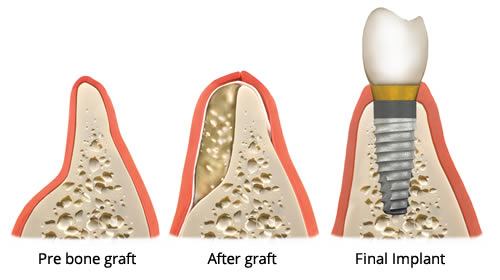Jawbone Deterioration
Bone grafting is where bone is built up or added to your jawbone when you don’t have enough to support the procedure you are looking to have performed. Bone grafting for dental work is often used for dental implants and implant supported dentures. In order for dental implants to be successful, the patient must have enough bone in their jawbone to support the implants. Our local Greensboro dentist will evaluate your jawbone and let you know if a bone graft is necessary prior to your implants.

Common Causes for Jawbone Bone Loss
Tooth loss & missing teeth - When a patient is missing one or more teeth, they generally start to experience bone deterioration over time. When there are no teeth there to support and stimulate the jaw bone, it begins to break down over time. The body 'no longer needs' the jawbone in these instances. The rates at which the bone deteriorates can vary from patient to patient but generally starts within the first 18 months of tooth loss. This makes procedures such as dental implants vital to securing bone density.
Periodontal disease - Periodontal (gum) disease can also be a major contributor to bone deterioration. This disease can also coincide with tooth loss, as the bone starts to lose density.
Wearing removable dentures long term - Traditional long-term dentures can also lead to bone density loss, as the body loses the "need" for the jawbone without tooth support. The jaw becomes less stimulated and can start to break down over time.
Injury/face trauma - Common sources of trauma to the jaw that can lead to bone loss are: knocked out teeth, auto injury accidents, broken jaw/fractures and a history of trauma that leads to tooth loss.

